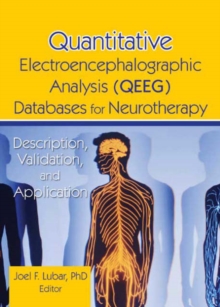Description
| Product ID: | 9780789004888 |
| Product Form: | Paperback / softback |
| Country of Manufacture: | US |
| Title: | Quantitative Electroencephalographic Analysis (QEEG) Databases for Neurotherapy |
| Subtitle: | Description, Validation, and Application |
| Authors: | Author: Tim Tinius |
| Page Count: | 200 |
| Subjects: | Medical diagnosis, Medical diagnosis, Neurology and clinical neurophysiology, Database software, Neurology & clinical neurophysiology, Database software |
| Description: | Quantitative Electroencephalographic Analysis (QEEG) Databases for Neurotherapy: Description, Validation, and Application examines the strengths and limitations of QEEG databases as a tool for the diagnosis of neurological and psychiatric disorders. Written by experts who have had considerable experience in either the development of databases or in working with them, this book can improve your ability to fine-tune existing protocols and develop new ones leading to better treatment, better long-term outcome, and fewer training sessions. Comparisons are made between currently available databases to help you determine what is best for your needs. This volume will be helpful to both novice and advanced neurotherapists, as well as medical doctors, psychiatrists, psychologists, licensed social workers, registered nurses, and biofeedback providers. Cutting-edge information on databases for research and clinical practice in neuropathy! Quantitative Electroencephalographic Analysis (QEEG) Databases for Neurotherapy: Description, Validation, and Application examines the strengths and limitations of QEEG databases as a tool for the diagnosis of neurological and psychiatric disorders. This book is written by experts who have had considerable experience in either the development of databases or in working with them. This text can improve your ability to fine-tune existing protocols and develop new ones leading to better treatment, better long-term outcome, and fewer training sessions. Quantitative Electroencephalographic Analysis (QEEG) Databases for Neurotherapy can help you differentiate cognitive states, clinical disorders, and EEG changes throughout the lifespan of a patient. This book also reveals the latest technological developments and methodological practices, and comparisons are made between EEG databases to help you determine what is best for your needs. Several controversies involving quantitative EEGs are discussed, including ethical concerns and early criticisms against the use of these methods for diagnostic purposes. This book addresses important topics such as:
|
| Imprint Name: | Haworth Press Inc |
| Publisher Name: | Taylor & Francis Inc |
| Country of Publication: | GB |
| Publishing Date: | 2004-01-12 |


